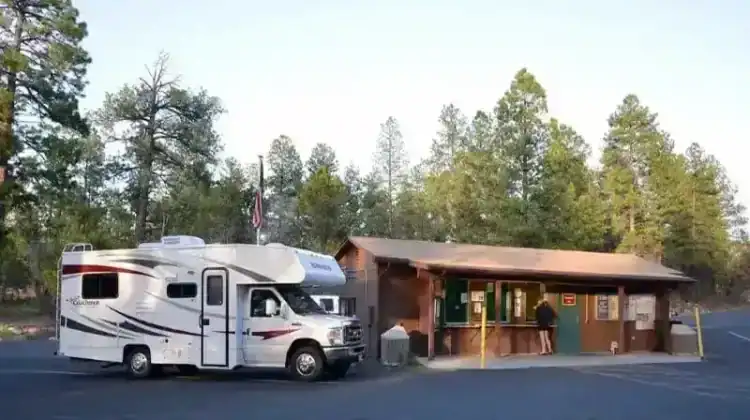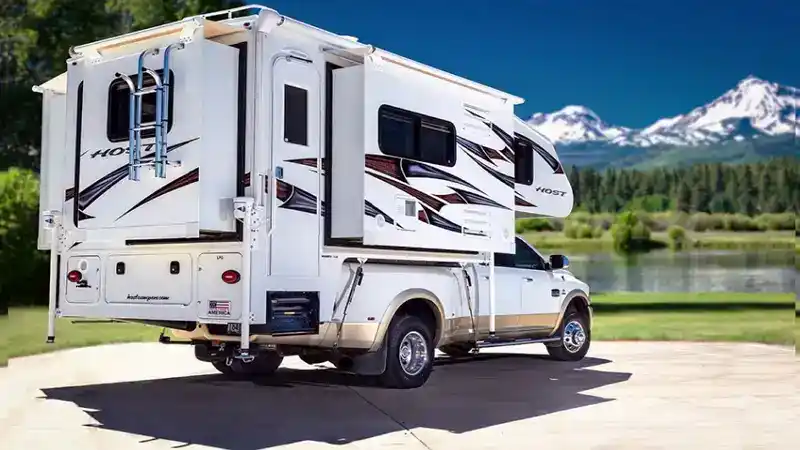
Thank you for reading our post, please rate this article at the end.
Reading Time: 12 minutesLast Updated on December 17, 2025 by Paul Clayton
Table of Contents
Where Can You Live In An RV? State Laws
Key Takeaways
-
- It’s all about Zoning Laws: The legality of living in an RV on a property, whether your own or a friend’s, hinges on local zoning laws, which vary by state, county, and city.
- The “Soft No” Rule: Generally, using an RV as a permanent dwelling is a “soft no,” meaning it’s often prohibited unless you can find a workaround or an exception. These exceptions may include having a building permit or being in an area without zoning laws.
- Accessory Dwelling Units (ADUs): A major loophole is getting your RV classified as an Accessory Dwelling Unit. This allows a secondary living space on a primary lot, though many cities have specific requirements (e.g., minimum size, no wheels) that may exclude RVs.
- Intent Matters: Some laws permit temporary RV living while a house is being built or renovated, but these are often limited to a specific time frame (e.g., six months to a year).
- Domicile vs. Residence: Understand the difference between a legal domicile (your permanent location for tax purposes) and a residence (where you currently live). Residing in a state with no income tax, such as Texas or Florida, can be beneficial for full-time RVers.
- Alternative Options: If living on private property isn’t feasible, you can consider residing in mobile home parks, campgrounds with extended stays, or embracing the nomadic lifestyle of constantly moving.
If you try to figure out whether or not it’s legal to live in an RV in your backyard or on someone else’s property, you’ll run into the same consideration everywhere:
You’ll be told to “check the zoning laws.”
Permanent RV Domicile Considerations: Establishing a permanent RV domicile involves considering state residency laws, zoning regulations, and associated costs, including building permits and other applicable fees. Maintaining good relationships with neighbors is essential, as enforcement may depend on complaints.
You might also like:
- 13 Tips For Living In An RV Park Full Time
- 11 Best Travel Trailers For Full-Time Living
- 5 Best RV Brands For Full-Time RV Living
- The Complete Guide to Full-Time RV Living: Must Read!
- 13 Best RVs For Full-Time Living With Family And Kids
- 7 Best Class B RVs For Full-Time Living
- The 5 Best 5th Wheels for Full-Time Living
Each state, county, and city has regulations and rules on what structures you can live in. It’s generally fine to park an RV on your land. Living out of it is usually another entirely different matter.
You’ll have several options for permanent RV living.
- A place to park a recreational vehicle permanently. In this case, your RV is registered with the state as a “recreational vehicle.”
- A place for your RV where it is considered an “accessory dwelling unit.” In this case, your RV is registered with the city and county as an accessory dwelling unit, not a recreational vehicle.
- Finally, the traditional route is parking in mobile home parks and campgrounds. Let’s look at this option to have all the bases covered!
The first two options are the focus because both might allow you to park your RV in your own backyard, live there permanently, or rent out the space. Let’s look at both options and see how state-by-state cases will affect you. States generally have laws that allow counties and cities to make final decisions, so you’ll probably have to check those more carefully.
Alternatively, we’ll compare the permanent recreational vehicle in the backyard and ADU setups to a more traditional RV camping and moving. You’ll need to weigh your options, costs, and considerations to decide the best move for your situation.
RVs as Permanent Dwellings
The general answer to the question of RVs as permanent dwellings is a “soft no.” Typically, you won’t be allowed to live permanently in your RV on your own or a friend’s property, and you probably won’t be able to rent it out to others.
It will matter what type of “backyard” you’re talking about. Generally, some states will be more receptive to the idea than others. As you’ll see, there are also some exceptions and loopholes. You might get some wiggle room here if you own the property, hold building permits, live outside of zones, or have an incredibly generous homeowners association.
So, for the most part, you can’t stick an RV on your property and have people live in it permanently. But here are some considerations that might get you around that “soft no.”
State Laws Against Recreational Vehicle “Use as a dwelling”
RVs aren’t generally considered permanent dwellings by the federal government. They can be used for travel, camping, and “recreation,” but usually not permanent housing. Using recreational vehicles as permanent dwellings is generally prohibited except in certain specially designated properties and zones.
Most states and counties have restrictions against using a recreational vehicle as a dwelling within certain zones. You might be subject to legal action if there’s any indication that the recreational vehicle is being used as a permanent dwelling. Some land, such as parks and campgrounds, is zoned explicitly for recreational vehicle dwellings.
Figure Out The Zoning Laws
This will be the linchpin in setting up that permanent residence RV. State and county laws prohibiting the use of an RV as a permanent dwelling only apply within certain government-regulated zones. Zoning laws vary not just by state but also by city and specific plot of land.
- Check for a city handbook that includes information on recreational vehicle laws and zoning regulations. It will inform you about where you can park your recreational vehicles and provide specific guidelines on what constitutes a permanent dwelling.
- Contact the city’s zoning office to verify the zoning regulations applicable to your specific property. It might be outside the zoning laws that prevent recreational vehicles from being used as permanent living arrangements.
When in doubt, ask! It can’t hurt to make a couple of phone calls to city offices to get some leads on parking your RV. If you explain what you want to do to the clerks, they may even help you figure out where to go!
The Spread of Zoning
In a sense, permanent RV living is becoming increasingly difficult to attain in cities because unincorporated land is becoming increasingly scarce nationwide. Local zoning is becoming more widespread, and larger portions of land will continue to be regulated.
On unincorporated land or land without local zoning, state and county laws still apply to RV living. Just because you’ve fallen outside of posted zoning laws doesn’t mean you shouldn’t still check with your county office.
Some places in the Midwest still have significantly fewer zoning laws. Setting up in San Diego or San Francisco might not be feasible, but relocating to the mid-America region offers more freedom with permanent RV living. For instance, Pulaski County in Kentucky still lacks zoning laws.
Homeowners Associations
In addition to the state, county, and city laws in play, there are also homeowner associations and property owner associations with rules about how you can and can’t use your property. So, even if you aren’t violating state, county, and city laws, you might still be unable to live in your RV.
Get Land out in the Country!
If moving is an option, you might be able to purchase some land in the country, outside zoning laws, to set up shop for your RV. Alternatively, find people who live outside of zoning laws. If you get a map of the zoning laws for your state or county, you might be able to find some connections with people who would charge only minimal rent for you to live in your RV out of their way and sight.
Intent to do Something Else
Many states and cities have laws that permit you to live in your RV on your property while building a house, restoring a home, or undertaking other construction projects. Most of these laws restrict how you are allowed to do this for–usually six months to a year. While not the permanent solution you might be hoping for, it does buy you some time while you try to figure out zoning and homeowners’ regulations or even qualify your RV as an ADU somewhere else.
Check your county and city laws regarding intent to do something else, as well as the temporary dwelling requirements for RVs.
Getting a Building Permit
If you have land that doesn’t have any structures on it, you can try to obtain a building permit, which allows you to live in an RV while your permanent residence is being built. If you have no intention of building, you can obtain extensions on the permit. It’s not illegal, but it is a bit shifty!
The national average for a building permit is $1,000, which isn’t cheap, but it does provide the peace of mind that comes with living legally on your RV on your property. Some cities may be extremely restrictive regarding building permits or may even be willing to take you to court to acquire a permit without having built, so be cautious with this. Always check with your city office to determine how strictly the building permit laws are enforced.
The Loophole: The RV as an “Accessory Dwelling Unit”
While you might not be able to live in an RV on your property, you might be able to put an RV on your property and rent it out to others. Zoning laws might prohibit permanent dwelling in a recreational vehicle, but they might allow the creation of accessory dwelling units. An accessory dwelling unit, or ADU, is a secondary housing structure on a primary lot that can be rented out.
California code defines the ADU as “an attached or detached residential dwelling unit that provides complete independent living facilities for one or more persons. It shall include permanent provisions for living, sleeping, eating, cooking, and sanitation on the same parcel as the single-family dwelling is situated” (65852.2. (a) (1)). As long as the RV allows for living, sleeping, eating, cooking, and sanitation, and is situated on the same land as the permanent residence, it should be considered an ADU.
California law doesn’t specifically prohibit RVs from being ADUs, but the situation becomes complicated quickly. RVs, in some cases, might be considered ADUs, depending on such considerations as:
- Is the lot big enough for an ADU?
- Is it less than 1,200 feet?
- Does it need separate utility metering?
- Is it taking up more than one parking space? no. California ADU law states that an ADU can’t require more than one parking space, which gets complicated when the ADU is an RV that is parked.
California state law allows cities and counties to pass ordinances for “accessory dwelling units” in residential areas for single-family or multifamily use. If you have a property with a house, you might be able to build or set up an RV as an accessory dwelling unit, which can’t be sold but can be rented out.
While we’re using California as an example, it’s essential to note that most state ADU laws will provide themselves with considerable flexibility for making case-by-case decisions. California’s law includes the clause: “A local agency may establish minimum and maximum unit size requirements for both attached and detached accessory dwelling units” (65852.2. (a) (1)). This allows individual counties and cities in California to raise the minimum size beyond the typical RV to  prevent RVs from counting as ADUs if they choose to.
prevent RVs from counting as ADUs if they choose to.
Norwalk, Connecticut, has taken a similar approach by establishing a minimum size of 400 square feet for an ADU, which is also the maximum size allowed for an RV under national law. Without explicitly stating so, they have effectively prevented RVs from being considered ADUs.
Some counties will also have specified regulations that prohibit RVs from being counted as ADUs or require them to have wheels. The San Diego, CA county states that RVs and park model trailers “shall not be used as an Accessory Dwelling Unit.”
Generally, it is assumed that the vagueness of most government regulations involving ADUs was intentional, allowing for case-by-case exceptions. With the right people skills and connections, you might be able to integrate your RV as an ADU.
Moving Might be a Problem
The ability to move might prohibit your RV from being an ADU, so you might have to show that the RV isn’t able to move, is going to move, or won’t be used to move around. You can’t park an RV for a few months at a house and call it an ADU. Sometimes, you might need a permanent foundation. You can’t live out of a “recreational vehicle” on the residentially zoned property, so you must ensure your RV isn’t used as a recreational vehicle.
Oregon’s building laws, for example, prohibit any structure on wheels from counting as a permanent dwelling or ADU. Washington also won’t allow anything with wheels to be considered an ADU.
Don’t take the wheels off too quickly. Some places make it easier for you to set up shop in a tiny house once registered as a recreational vehicle (though this won’t solve the problem of parking in a backyard). Some counties in California and Massachusetts place fewer restrictions on RVs than on other tiny dwellings!
State ADU Laws
States generally do not provide extensive direction for ADUs, but they do establish standards for counties and cities to follow. The bulk of ADU legislation is happening at the city level and is happening fast. Many updates to ADU legislation have been made over the last five years. California and Vermont permit local governments to allow ADUs under specific conditions. In other states, ADUs are actively encouraged. A helpful list of state and county ADU laws is available here.
- Chicago, Illinois, is currently not allowing new ADUs to go up, so RV or not, you’re out of luck.
- Minneapolis has inserted a seemingly clever way of heading off RVs as ADUs, saying in their code that “the primary exterior materials of the detached accessory structure shall be durable, including but not limited to masonry, brick, stone, wood, cement-based siding, or glass.” RVs are usually not constructed from wood or stone, but from lighter materials that are better suited for travel.
- Oregon recently considered relaxing ADU and RV laws, allowing both on land zoned for rural residential (different from single-family or multi-family) and agriculture.
- Portland currently won’t allow you to use “anything with wheels” as a permanent housing structure, so RVs definitely won’t count as ADUs there (of course, again, it’s more complicated if you take the wheels off!).
- Unsurprisingly, crowded New York City won’t allow ADUs at all.
- The city of Bozeman in Montana has a colorful PDF about ADUs, but does not mention wheels or RVs.
Many places won’t mention whether RVs will count as ADUs, leaving themselves free to decide on a case-by-case basis. Always check the state and county websites for the most up-to-date information, as tiny housing is a hot topic and many local and state governments are revising and passing new legislation.
Homeowners Associations
Like recreational vehicle laws, many homeowner’s associations also have additional regulations about the maintenance and renting of ADUs. Even if state, city, and county ordinances all permit your RV as an ADU situation, you may still violate homeowner association laws.
You can either accept these rules or petition the association to make an exception in your case. You might be able to gain leeway if you’re attempting to rent the ADU to a family member.
Alternatives to Parking RV or ADU on Property
Mobile home parks and campgrounds allow you to live in your RV on a different property.  Several types of land are specifically zoned for RV living.
Several types of land are specifically zoned for RV living.
- Vacation parks often have rules and restrictions on how often you can stay and how many days in a row you can be there to keep a certain standard of living.
- Residential parks are designed for you to live full-time.
- Campgrounds that have extended stays.
- I am driving around! Stay in parking lots, on streets, and under the stars.
- Some RV parks will allow you to live there for a cost.
Whichever you choose, take advantage of the fact that RVs have wheels and can move from location to location.
Some States are Friendly, Some Aren’t!
Texas, Florida, and South Dakota are all friendly to RV living. You may still be unable to obtain the zoning laws you want, but there is no income tax, and it’s relatively easy to obtain domicile status.
Several Colorado counties have recently made headlines by passing laws that are friendly to tiny houses. Such laws may also allow greater access to permanent RV living.
Nevada has many open spaces, but vehicle registration is expensive —around $2,000 for an RV.
Going for Domicile Status
When considering becoming a permanent RV resident, remember that domicile and residency status are distinct concepts. Residency refers to where you live — you can have more than one residence. Domicile is your intended permanent location and is based on your state. It affects your legal paperwork and taxes. Try to domicile in a state without an income tax if you can.
Other Considerations
You have three primary options for permanently living in your RV. Suppose you’re headed to your backyard or your neighbor’s backyard. In that case, you can either try to get the RV considered an ADU or attempt to legally live in the RV permanently on their property with the RV considered a “recreational vehicle.” Of course, you can always keep it moving and stay in RV parks and campsites. Here are some considerations when picking your option:
Cost
ADUs and permanent RV dwellings will have different costs and fees. Different cities and counties will require different certifications for your ADU or RV, so it’s essential to familiarize yourself with these requirements before making a decision. Building permits and land can be expensive. Renting at parks might cost you more in the long run! ADUs require extensive inspection and certification to be eligible for approval. If you’re trying to set up your RV as an ADU on your friend’s property, you may have to help them with the fees and permit process.
Your Long Game
Going for ADU might require removing the wheels from your RV, which will prevent you from moving! Buying land and obtaining building permits can be expensive, which may prevent you from being able to move. If you have an RV to travel in, the ADU might not be your best option, but if it’s primarily for housing and living, the ADU might be just fine.
Your Neighbors and Your City
Ultimately, residency in a mobile home will determine who cares and who makes phone calls. Laws about zoning and ADUs don’t count for much unless there are people to enforce them. If your neighbors are chill and your city officials aren’t running out of their way to move RVs, you might be good, even slightly bending the rules.
Conclusion: Check, Double-Check!
RVs allow freedom of movement! While finding a permanent residence in an RV is tricky, you can always move. The national opinion is certainly swinging toward smaller, more affordable housing, so expect RV residencies and RVs as ADUs to become even more commonplace in the coming years.
Remember, every state, county, and city official is different! When in doubt, make the phone call to check. Also, remember that most states are revising and changing legislation on recreational vehicles, ADUs, and small housing. It is a national issue, and cities are revising their stances to make housing more affordable while maintaining certain standards.
Home page
Back to the top of the page







